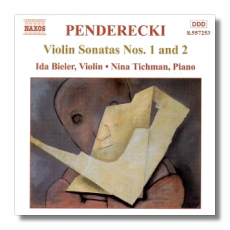
The Internet's Premier Classical Music Source
Related Links
- Penderecki Reviews
- Latest Reviews
- More Reviews
-
By Composer
-
Collections
DVD & Blu-ray
Books
Concert Reviews
Articles/Interviews
Software
Audio
Search Amazon
Recommended Links
Site News
 CD Review
CD Review
Krzysztof Penderecki

Violin Sonatas
- Violin Sonata #1
- Violin Sonata #2
- Miniatures
- Cadenza for Solo Viola
Ida Bieler, violin
Nina Tichman, piano
Naxos 8.557253 DDD 55:59
Chamber music has not played a large role in Krzysztof Penderecki's output; orchestral, choral, and theatrical works are more typical. Nevertheless, the few chamber works he has composed are not negligible. In fact, the five-movement Violin Sonata #2, completed in 2000, is a fine addition to his catalogue of works. (This is its first recording.) This 37-minute work is well within the realms of tonality, but that is consistent with Penderecki's style over the last two decades. It is impossible not to hear Shostakovich in this sonata, both in the spiky and sardonic faster passages, and in the melancholy slow movements. Who would have guessed, back in 1960, that this was going to be where Penderecki ended up? (Well, he's still among the living, so perhaps more surprises await!)
Most of us became acquainted with this composer through the avant-garde music that he wrote between the late 1950s and the early 1970. Since then, in the Violin Sonata #2 and other relatively recent works, he has turned away from the experimentation of his youth. One forgets that Penderecki didn't become an avant-garde composer overnight, however. The Violin Sonata #1 was composed in 1953, and it also shows the influence of Shostakovich, who was enjoying a new level of acceptance in Communist Eastern Europe at that time. How strange that the first sonata so closely foreshadows the second, written almost five decades later! It's almost as if the music that made Penderecki famous – the St. Luke Passion, Threnody for the Victims of Hiroshima, and others – were a symptom of temporary rebellion which the composer needed to work through.
The three brief Miniatures date from 1959. Not four minutes long in toto, Penderecki wrote them for himself to perform. These are tiny sketches, also atypical of what the composer was doing at this time. The Cadenza (1984) is an "appendix" to his Viola Concerto. It was transcribed for viola by Christiane Edinger in 1987.
With cellist Maria Kliegel, Bieler and Tichman are members of (wait for it) the Trio Tichman-Bieler-Kliegel, which was founded in 2001. Bieler and Tichman are expert musicians, and there's nothing that they don't give to these performances, which were recorded in 2003 by German Radio.
Copyright © 2004, Raymond Tuttle


















